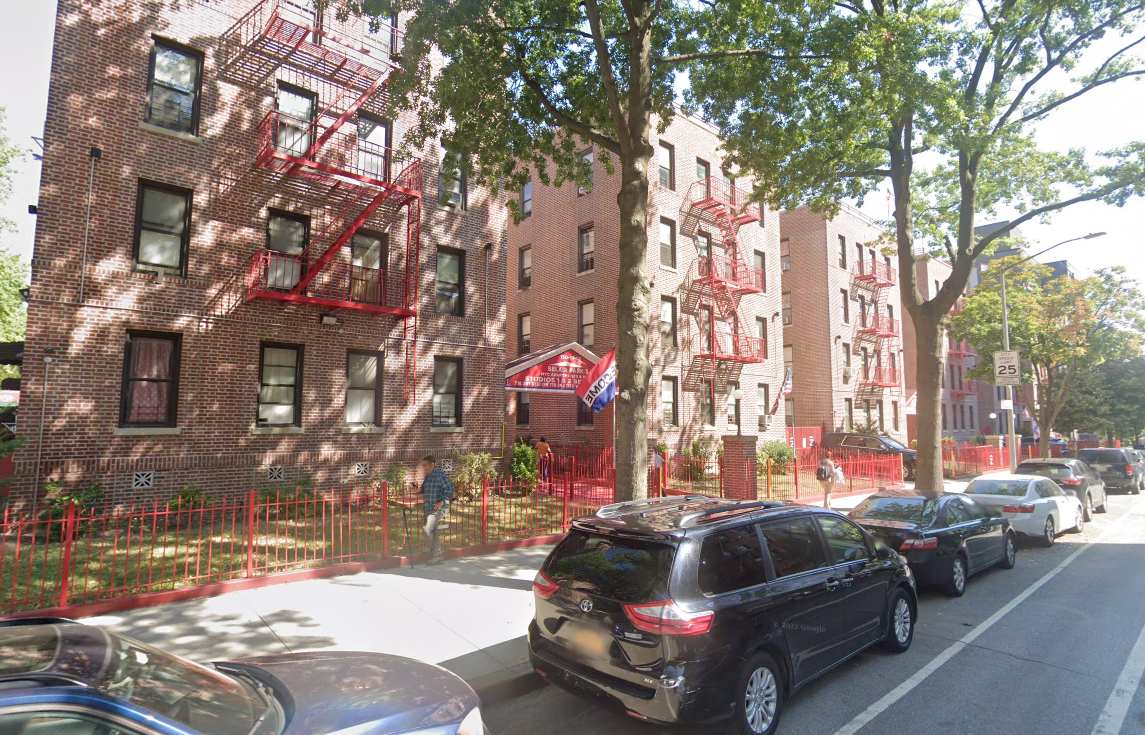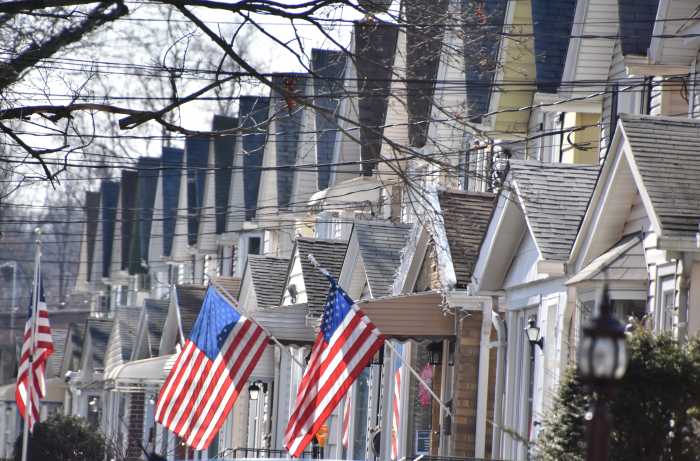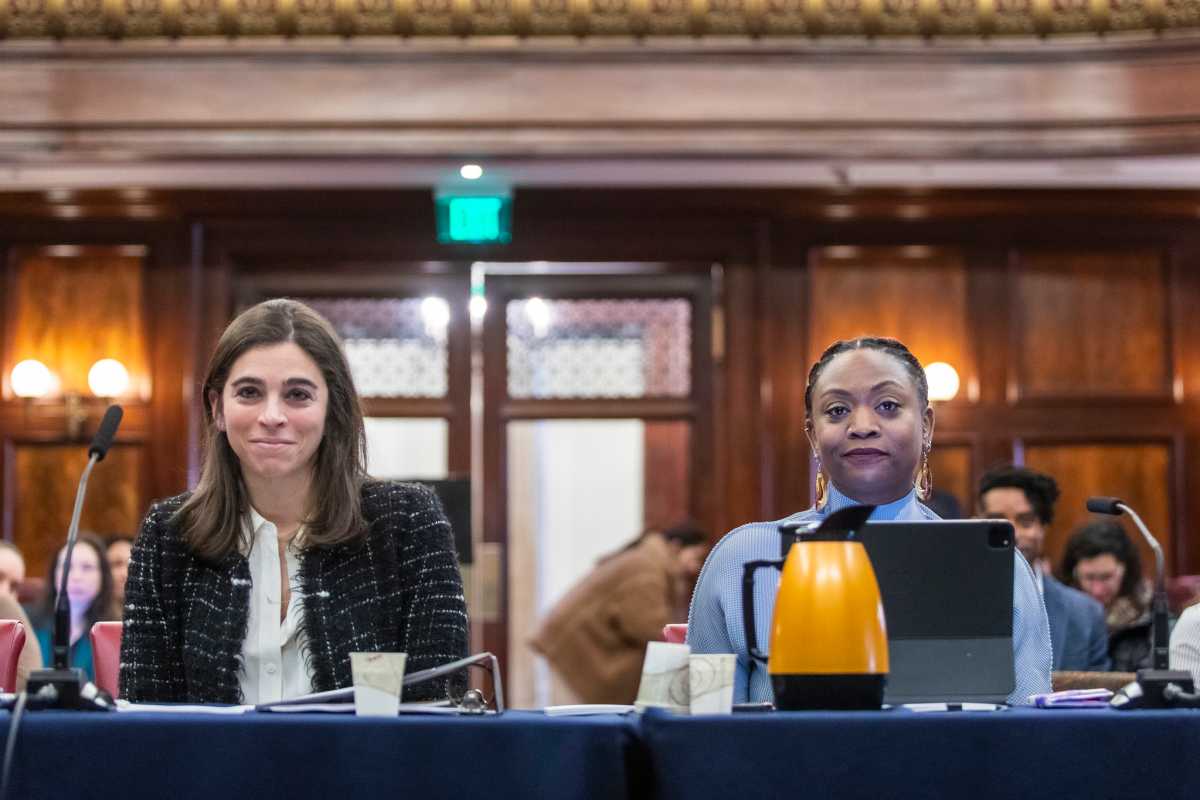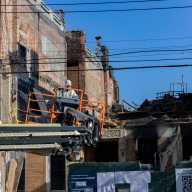Tenants from a collection of rent-stabilized buildings in Queens gathered outside the offices of the New York Division of Homes and Community Renewal (DHCR) last Friday, May 24, to announce their plans to file an Article 78 legal challenge. The action seeks to compel DHCR to address and resolve their pending appeals concerning rent increases imposed by their landlord, Zara Realty.
“DHCR has improperly approved countless MCI increases of hundreds of dollars per month across Zara buildings, displacing hundreds of families over the years, despite the fact that Zara’s MCI applications have been riddled with discrepancies and violations,” said Doug Ostling, a resident of one of the Jamaica buildings. “Tenants have appealed these bad decisions but have been waiting on decisions on their appeals for as long as seven years! We are done waiting. We are here today to announce our lawsuit against DHCR to force the agency to finally make decisions on our appeals of these unjustified rent increases.”
The tenants allege that Zara Realty has not been able to justify the rent increases, arguing that this is illegal. They claim that the rent has been inflated based on claims that the extra money is going toward major capital improvements to the building, but the tenants said there have been very few updates.
“Some of the MCI work was totally unnecessary and actually harmful for tenants, and done without the permission of DHCR, like changing the intercom and lock, which left us unable to get into our building,” said Moreom Perven, another resident of one of the Jamaica buildings. “The law says that is not allowed. But unfortunately, it seems like DHCR doesn’t care about tenants or the law. They only care about making it easy for landlords to get more money.”
In response, Zara stressed the importance of safety and continuous building improvements for the betterment of the tenants. A spokesperson mentioned it is important that, as property owners, they must be meticulous in ensuring the safety and security of the tenants, including through capital improvements and going to great lengths to verify who lives on each site, ensuring access is granted exclusively to them.
Those who filed the suit also claim that Zara Realty has often inflated the costs of construction and that the false improvement claims were used to get hundreds of tenants out of the buildings.
“[DHCR] let Zara charge us MCIs for millions of dollars, even though Zara itself tells the Department of Buildings that the work cost them only 10% of that,” Perven said. “Not only that, some MCI work seems to have been incomplete and deficient, like pointing and waterproofing. So not only are they inflating costs, they also leave portions of the building undone, old, cracked, exposed to elements, so tenants often have leaks from bad work.”
“Every single Zara building is going through the same pattern. If tenants are recognizing Zara’s systemic abuse, then how come DHCR is failing to recognize this? Zara only sees tenants as money-making machines. Zara is the clear example of the abuser of the system. and that is why they are being sued by the Attorney General. And DHCR is the enabler. ” stated Perven. “We filed appeals more than three years ago but DHCR is still making us wait while we bleed all our money.”
A spokesperson for Zara said the allegations levied against them were baseless. In a statement responding to the Article 78 filing, Zara pointed out that DHCR inspects all capital improvements thoroughly and that all projects that end up getting approved do so after extensive documentation is reviewed. This includes all the items being disputed by the tenants and their representatives.
“After losing on the merits, these lobbyists are seeking to subvert a lengthy review process that the State of New York already has in place,” Zara said in a statement. “It is categorically false for these anti-landlord lobbying organizations to claim otherwise.”
Over the past decade, the rents at these buildings have increased hundreds of dollars. Those living in these buildings were waiting three years for DHCR to decide whether or not these rent increases were justified. With the Article 78 filing, they hope to get a ruling from DHCR soon.
“It’s time for DHCR to answer for failing to respond to tenants, especially when landlords are using the major capital improvement process as a means to illegally inflate rent at rent-stabilized buildings,” said Johnny Thach, a staff attorney with Legal Services NYC, which is representing the tenants. “Tenants have been forced to drain their savings and fixed incomes to cover fraudulent rent hikes from a known slumlord-style landlord. DHCR needs to do its job and issue the right decisions for these tenants.”
Zara claimed that, contrary to the claims of the tenants and Legal Services NYC, several updates have been made to the buildings to modernize the infrastructure, with the extra rent heavily contributing to it. Such work includes updating building exteriors, roofs, elevator systems, HVAC systems and security measures. Zara also pointed out that all this work was done within compliance of regulations set by the state and city, including the New York State Climate Act, Local Law 97 Greenhouse Gas Emission Reduction, Local Law 84 Benchmarking Utility and Water Bills, Local Law 87 Energy Audit and Commissioning and Local Law 132 Lighting Upgrades and Submetering.
“These mandatory upgrades are subject to state housing agency review and authorization, ensuring that improvements meet regulatory standards,” Zara said. “Without the ability to invest in such critical infrastructure, buildings citywide would inevitably fall into disrepair. As mandated by recently enacted city and state climate laws that impact all city buildings, Zara has been proactive to get ahead of the 2025 and 2030 environmental requirements, actively working to decarbonize, solarize rooftops and replace older heating systems with greener, energy-efficient models.”
Additionally, Zara pointed out that city or state approval is required for them to raise the cost of rent or major capital improvements. When it comes to rent-stabilized apartments like these, the NYC Rent Stabilization Board is responsible for raising the rent. The board’s process also allows for the public, including tenants and landlords, to take part in the decision-making process. “For the tenants to claim that the company is raising rent is categorically, absolutely, unequivocally false!” the Zara spokesperson said.
MCI costs are handled by DHCR rather than landlords. Similar to rent, this long process takes the tenants into consideration upon a landlord’s request for an MCI increase. After taking the application and responses from tenants into consideration, DHCR will end up deciding whether or not to approve it. However, this process can take multiple months or even years.
In addition to this legal challenge, Zara Realty is also facing a lawsuit for allegedly violating rent stabilization laws by New York State Attorney General Letitia James.
“I have been living here since 2000 and I am a cancer survivor, a disabled person and a single mother. My only source of income is my SSI benefit, which is almost nothing for now. I am using almost 80% of my income only for my rent,” said Nahida Begum, a building resident at Beech Avenue in Jamaica. “You can calculate how tight my financial situation is based on my income. I am barely surviving. Now in my building, Zara has filed for not just one, but two MCIs. Most tenants in these buildings are like me, living month to month on a limited income. If DHCR approves these MCIs, I would have an increase of $200 in my rent! That is basically an eviction for me.”
When the tenants announced their intention to file an Article 78 petition, they were joined by their attorneys and multiple local lawmakers, including State Senators John Liu, Jessica Ramos, Leroy Comrie, Toby Ann Stavisky, and Assemblymember Ron Kim.
“Rent-stabilized tenants living under the Zara brand have endured too many years of unjustified rent increases,” Liu said. “Unfortunately, these rent hikes, often performed under the guise of Major Capital Improvements, have been continually rubber-stamped by DHCR. We are calling on DHCR to do the right thing and allow tenants a chance to appeal these improvement claims and for the courts to order rent reductions and reimbursements that are fair to tenants.”
“We have seen this show before— a landlord, in this case, Zara Reality— trying to unlawfully raise rents by filing Major Capital Improvement (MCI) applications with the NYS Department of Homes and Community Renewal (DHCR), the state agency that oversees rent-stabilized buildings in New York,” Kim said. “I implore the DHCR to follow the letter of the law and deny the Zara application because it will have deleterious effects on these tenants.”
The Jamaica buildings in which the tenants reside are located at 150-01 88th Ave., 150-03 88th Ave., 150-05 and 150-07 88th Ave., 150-09 and 150-11 88th Ave., 150-01 to 150-11 88th Ave., 88-05 171st St., 162-20 89th Ave., 88-15 168th St., 140-30 Ash Ave., 140-50 Ash Ave. and 140-60 Beech Ave.



































